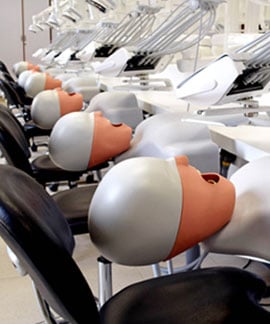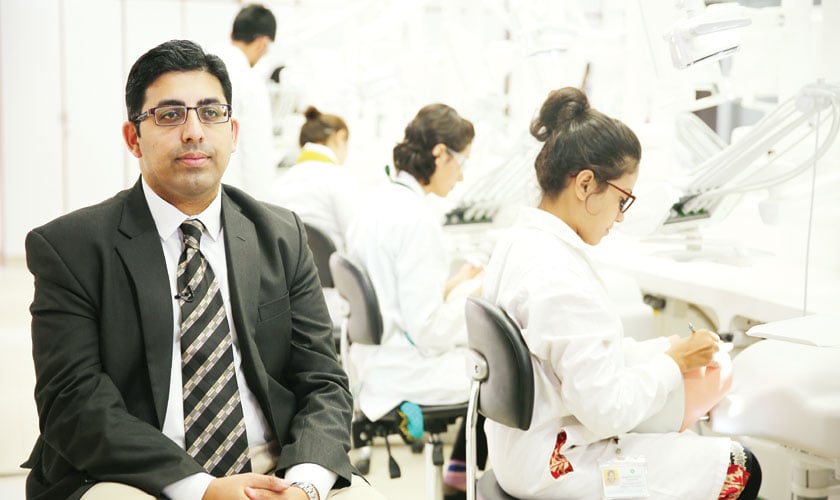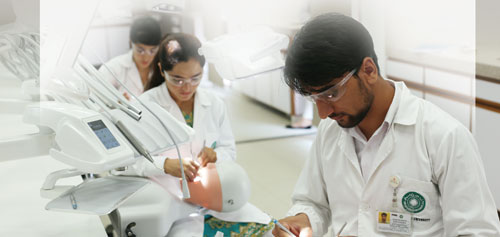COVER STORY
It was just another afternoon at work; except that I was a lot nervous. I had to go interview the Head of Dental Section, Exploring the world of dentistry (AKUH), and I was dreading not being there on time, especially since the person who had set up the interview had specifically asked me to. My fears were confirmed when I stepped out of the cab and checked my watch: it was 3:05 pm. I was supposed to be at his office at 3! As I walked down corridors after corridors, the silence getting to me, only to find out that he wasn’t in at the moment! I broke into a happy dance - in my mind, of course. While I collected my nerves, he arrived, joking about forgetting his car keys and ushering me into his office, I was taken aback.
This was the man who, besides being the HoD, was also the Associate Professor (Operative Dentistry), and has been serving as a full-time faculty at AKUH, Karachi since November 2007, where he is involved in poly-specialty Restorative Dentistry practice. Dr. Farhan Raza Khan, after completing his BDS with honors and being awarded the KMDC Best Graduate Award on securing first position and a gold medal for the same in 2000, pursued his MS, PhD, MCPS and FCPS. It’s not just the academics; the professional services he continues to render are of equal importance. Dr. Farhan has published 86 research articles in various peer-reviewed journals, co-authored four books and is currently serving as a manuscript reviewer for 12 prestigious journals, including JCPSP and Journal of Periodontology, USA. He is also a member of various international dental societies and professional associations and has been Residency Programme Director in Operative Dentistry at AKU.
And there we were, sitting in his not-so-big, organized office. Unlike some arrogant, strict sort of doctors we come across, Dr Farhan is polite, friendly and funny sort. Read on to learn about this important field...
A very skill-intensive discipline and the need for a dental lab
How would you feel if your dentist - a certified one, that is - fails to perform procedures properly? Not satisfied, right? Like an artist who knows how to create stuff, a writer who knows how to use his words, a dentist should have craftsmanship in his hands to deliver better outcomes. His treatment must be reliable. For that purpose, it’s essential that we teach these skills to aspiring dentists.
“The dental colleges in Karachi are still not teaching skills to their students. That is, an under-grad attends lectures on how to extract a tooth, but if enough clinical exposure is not provided, the quality of care is compromised. Powerpoint slides, YouTube videos are not the same as hands-on experience,” he stressed. “I know it’s difficult to get patients for this purpose, especially in private sector. A dental college is the ideal place, but some have limited resources, others have more students compared to the faculty. At AKU, we realized we needed a high-tech lab where we can train people in terms of procedural skills - and not just the postgrads but general dentists as well. This simulation lab was recently inaugurated.

“This sort of training is a norm in the western world. Imagine, a patient has to undergo irreversible procedures like drilling and the dentist performing it has no training beforehand. It’s unfair to think that the dentist can master that level of competence by doing it once or twice; you have to do a procedure hundreds and thousands of times to achieve that level of confidence while attending patients. So, we can’t risk treating patients without experience and we can’t have experience without treating patients. This is where the concept of practicing on models or mannequins come in. Not just for dentistry, for other departments as well. Practising it multiple times would ensure there would be no problem, that the dentist would not panic while treating a real patient.”
Facilities
“The residents have all the facilities such as a high-tech lab and a very good learning resource center; we’ve subscribed to hundreds of journals and entire databases. Not a single student works unsupervised. As 90 percent of the faculty isn’t allowed to have private practices and are fully committed to the institution, the students enjoy a one-on-one interaction with their teachers wherein they observe them while counselling, planning and executing the treatment. They not just learn these skills but also learn to communicate with patients, manage time, and practice professional ethics, etc.
“Apart from this, there is a department called Postgraduate Medical Education Department that governs the entire system and everyone including trainers and residents alike are held accountable for their actions here. It ensures transparency at each step.
“We take undergrads, grads or house officers applying for electives; these are two-week long placements where the students are allowed to observe silently and not interfere with the patient procedure.”
Exchange programme
“Even though we follow the British system and the institution has signed MOUs with plenty of international universities (e.g. McGill University), we have a problem. Our system is a little different, which means students who go abroad on exchange programmes don’t get their license to practice without difficulty. It takes them a good two to three years to get it. Meanwhile, they won’t be allowed to treat patients. So, it’s not practical. What’s better is to get speakers as visiting faculty or through teleconferencing so they stay up to date.
The scope of your field
“If you only have the clinical service in mind, then you limit the scope of dentistry by a great extent,” Dr. Farhan explained. “However, if you see dentists as physicians of oral cavity, you have a lot to choose from - you can be a comprehensive care provider rather than just sticking with one.
“Dentistry is an amalgamation of six different disciplines, which translate to six distinct specialties. The College of Physicians confers degree for five of these, out of which two programmes are available at AKU. AKU does not have any undergraduate programmes in dentistry. So far, 21 postgrads in Operative Dentistry and 19 in Orthodontics have been produced by the university. Some are part of the university’s faculty, some are making their career as researchers while the rest have gone to serve in other parts of the country or abroad.”

Admissions and promotions
“Unlike other places where a person is promoted based on their age/experience, individuals working at AKU have to earn it. It would not matter if you have been a part of the faculty for 15 years. You have to spend hours in teaching, you have to contribute thoroughly researched articles to peer review journals of impact factor; basically, it’s all about going an extra mile! Here, the leadership position is available for three or six years.”
Admissions also follow the same policy. The process is so rigid that out of every 100 applications received, only four are selected. “These are the best of the best, and there’s low probability of them being underachieving students. But there are times when certain circumstances may force a high-achiever to not perform the same way. The right way to deal with them is counselling. In a way, it’s good that there are only four residents in a single class; this allows a cordial relationship between the teacher and the students. Mostly, they would come themselves to talk about anything that’s troubling them, and when they don’t, you can simply sit down and ask!”
I recalled the (late) principal and Chemistry professor at my college. Despite his years of experience and knowledge, he wasn’t exactly accessible and we would automatically maintain a distance. “That’s old school. Fear is not conducive to learning. In a mentorship model, on the other hand, asking questions is a norm.”
Final word
I couldn’t help but like and respect the person sitting opposite me, even though he is of the opinion that it’s not possible for everyone to respect an individual. “Your juniors would respect you, yes, but you won’t be like a friend to them. They won’t share anything with you,” he smiled.
So, are there any funny or weird things that they’ve shared with him with respect to his department? “Actually, I find it funny how people see us as proud and kind of anti-social. My comeback is usually, ‘Hum tumhari tarhan farigh nahi.’ In reality, I feel jealous of my friends who have a social life. I know their set of challenges is different from mine and maybe it’s just a frame of reference that we refer each other in this manner.”
His students think of him as a workaholic. “I read it somewhere, ‘Us aadmi say daro jo chai nahi peeta. I don’t drink tea,” he admits sheepishly. “Honestly, when I work, I work 14 hours in a row without a break even for a sip of water. I know it’s not healthy,” he added. And, he is all for genuine criticism, and takes it as a challenge to improve himself.
Additional information by Hamza Hassan
Photo credits: AKU
Did you know?
After Partition, there was only one dental college in Pakistan - de’Montmorency College of Dentistry in Lahore; another college was built in Punjab (Multan) and until 1979, they were the only dental colleges that were operational in the country. Then another opened in Balochistan (Quetta), one in Khyber Pakhtunkhoa (Peshawar) and one in Sindh (Karachi).
But there were not enough dentists. Patients with an appointment waited for as long as three hours before they were called in for checkup.
The first private dental college started in 1995; by 1997, the numbers increased to three: KMDC, BAQAI, and Fatima Jinnah. Now, there are around 40-45 colleges in Pakistan: seven in Lahore, 12 in Karachi; they are even present in cities like Hyderabad, Mirpurkhas, Abbotabad, Mardan. The exact number is not known because a lot of colleges get de-recognized later.
As a result of this boom in number of colleges, students who were previously granted admission based on their Intermediate results had to take entry tests. All this was taken positively; people were starting to consider dentistry as a noble profession.
Next, a dire need for postgraduation was felt in connecting pass-outs with the practical world and due steps were taken to introduce it in the system. Even for teaching at these dental colleges, one must have done their post graduation; a teacher has to be more qualified, more experienced, more competent.
We are still developing, but we are moving in the right direction. The current teaching and training structure in Pakistan is not less than any country in the world.
Did you know?
More than 90 percent of dental problems are completely avoidable! Issues like gum bleeding, infection and cavity can be easily prevented if people have more awareness about oral hygiene.
AKUH - a short history
“AKUH is an institution where both teacher training as well as hospital services are available. Its medical college started in 1983 while the hospital became functional in 1985. In the beginning, the focus was only on providing dentistry services. It was only in the 2000s that academic programmes were introduced, and the same faculty who was providing patient care was consequently hired for teaching and training, too. The first ever post-graduation course in our department initiated in 2002 in Operative Surgery. It was a four-year programme. Students who had already done their graduation from other univeristies, and their house job and cleared their FCPS Part I examination would apply,” said Dr. Farhan who is one of the first graduates of that programme.
“In 2003, it was for another discipline. And for the past 15 years, it was just these two programmes that were offered at the dental section. Then, almost two years back, we started an undergraduate programme of Dental Hygiene. This was the first time that people could go to Dental Hygienists; prior to this, there were ‘technicians’ who, although trained with the apprentice model, had no formal assessment of competence. This helps distribute the work load between hygienist, dentist and a specialist and saves time.”